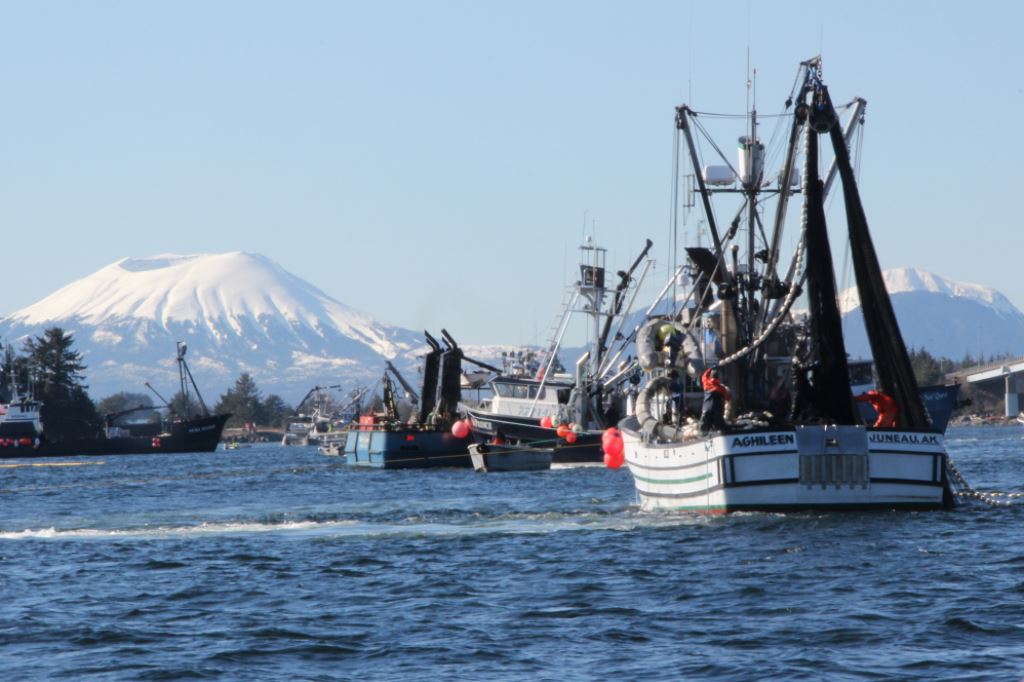
Several proposals to make changes to the commercial sac roe herring fishery in Sitka Sound failed to win support from Alaska’s Board of Fisheries over the weekend. Two of those would have made a permanent move away from a competitive fishery. Another would have allowed permit holders to opt for an alternative way to harvest herring eggs for market.
Two proposals sought to end the competitive purse seine fishery in Sitka Sound for sac roe and replace it with an equal share fishery. The 47 permit holders would each get a share of the year’s guideline harvest level. One of those alternatives also sought to allow multiple permit holders to fish from one boat and a limit to the number of boats out fishing.
Andy Kittams of Petersburg, one of the fishermen proposing the change, said it would slow down the fishery.
“There will no longer be the need to fight for fish which is what our fishery has become known for,” Kittams said. “This in turn will make our fishery safer. The vessel collisions and net damage will vanish. We fishermen will be working together, not fighting with each other, and will produce a better product and have less impact on the Sitka Sound environment.”
Kittams said the idea had the backing of most, but not all of the permit holders.
Fishermen have already been working together in some instances. In 13 seasons over the last four decades permit holders have agreed to a cooperative approach. Sometimes that’s used when only a little of the guideline harvest level remains or if seafood companies put limits on what they can process.
Another fisherman Jamie Ross of Homer opposed the change.
“Yes we are going to be forced because of market constraints to be in this coop situation for probably the foreseeable next four or five years,” Ross said. “But I tell you what, as a guy that’s 60, I’m really looking forward to the day when I can go competitive fishing again. I live for it. I love it. It really is, it’s like a Superbowl. I mean I’m sorry, it is. It’s the thrill, the joy of herring fishing that is the competition.”
The competitive fishery can feature short 15 minute openings with many seine boats packed in a small area, setting nets on schools of herring. Collisions have led to lawsuits in some seasons. Supporters of the change said an equal share would be more important in years of low abundance. But the board was not swayed to put that regulation on the books.
“While I understand from the user group that this is kind of currently being done through a cooperative situation already that it’s hard to have the reliability on a handshake deal but at the same time it’s essentially providing for the intent of the proposal which is to reduce the competition so I’m not going to put it in a regulatory action if it’s kind of currently being done already,” said McKenzie Mitchell of Fairbanks.
The first equal share proposal failed on a 5-1 vote with only John Jensen of Petersburg voting yes. The board then saw no need to take up the second.
The board then turned its attention to a proposal to give Sitka Sound permit holders the option of an open pound harvest of herring roe on kelp, instead of the sac roe seine fishery. In open pounding, fishermen hang kelp in the water, allowing herring to swim by and cover with eggs.
Sac roe permit holder Ryan Kapp, spoke on behalf of the proposal, submitted by his father.
“Instead of roe on kelp, I want to make kelp with roe,” Kapp said. “There’s opportunities out there, it’s a good thing maybe that 20 years has passed because there’s opportunities out there for new marketing opportunities that didn’t exist 20 years ago. Sushi in grocery stores didn’t exist 20 years ago. Kelp chips from Costco didn’t exist 20 years ago.”
Kapp said the change would also help with conservation concerns by using the eggs without killing the fish. But opponents, like Paulette Moreno, did not want to see another commercial fishery opened in the area.
“This would affect our daily existence and this will affect my subsistence levels in what I may be able to give my families.”
Kapp submitted the proposal in concept and the board voted to table it overnight so staff could draft regulatory language for how that would work. By the time that wording came up for a vote it had run into other problems.
The Department of Law’s Aaron Peterson said the proposal likely violated a prior Alaska Supreme Court ruling prohibiting allocation within a fishery.
“As it stands now it would take GHL (guideline harvest level) away from the current sac roe fishery, on a percentage basis of the permit holders that choose to fish pounds,” Peterson said. “And the problem that that creates is essentially creating an equal share fishery within the same fishery without the analysis that would be required of that, the conservation concerns, the economic concerns and so on and so forth.”
Board members did not support moving that proposal forward at least not this cycle.
“Got some regulatory language now at least, the proposer has,” said Israel Payton of Wasilla. “Encourage him to maybe work, you know, this is a step closer for him, potentially to have at least draft language moving forward and vetting it through more of the public and changing it.”
That open pound proposal also was opposed by some Southeast commercial fishing organizations. and it also would have required changes by the Commercial Fisheries Entry Commission.
The board agreed unanimously to take no action on the proposal.











